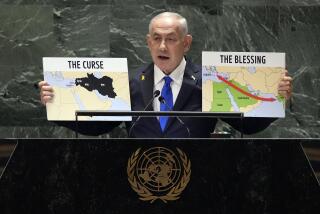Sharon Says 2005 a ‘Historic Opportunity’ for Peace
- Share via
JERUSALEM — Prime Minister Ariel Sharon, insisting that Israel has no wish to rule the Palestinians, declared Thursday that 2005 would be “the year of a great historic opportunity” in the Middle East.
“We have to seize the initiative; this is the time, the hour, the national test,” Sharon said, summing up a tumultuous year that saw the death of longtime Palestinian leader Yasser Arafat and a series of internal Israeli political battles over the prime minister’s plan to uproot Jewish settlements in the Gaza Strip.
Sharon spoke at the Herzliya Conference, an annual gathering of policymakers, academics, senior military officials and analysts that he has used as a forum for delivering something akin to a state of the union address.
Although the prime minister did not unveil new initiatives -- unlike last year, when he used his speech at the conference to spell out his Gaza withdrawal plan for the first time -- his address was notable for the conciliatory tone toward the Palestinians.
Sharon repeated Israeli pledges to do everything possible to ensure a smooth vote Jan. 9, when the Palestinians will pick a Palestinian Authority president to succeed Arafat. The front-runner is Mahmoud Abbas, a former Palestinian prime minister who this week reiterated his opposition to the use of violence by his people in their quest for statehood.
“We do not want to rule over you, or to run your lives,” Sharon said, addressing the Palestinians directly. But he said the transitional Palestinian leadership, and the new government that emerges after January’s vote, must do its utmost to quell violence by militant groups such as Hamas and Islamic Jihad.
After a year of bruising political battles over his Gaza withdrawal initiative, the prime minister signaled that he has no intention of veering from his plan to relinquish the impoverished, crowded seaside territory.
Amid prolonged infighting over the pullout plan, Sharon lost his parliamentary majority and is trying to form a new governing coalition with the left-leaning Labor Party and two smaller parties.
The Israeli leader, who spent decades overseeing the drive to establish Jewish settlements in the West Bank and Gaza, is now bitterly reviled by leaders of the settlement movement. Israel’s security establishment has repeatedly and publicly expressed fear that the prime minister, like the late Prime Minister Yitzhak Rabin before him, could be assassinated by a right-wing extremist.
“It is clear that we will not remain in Gaza under any permanent agreement,” the prime minister said at the conference. Sharon’s government has set a timetable that calls for abandoning the 21 Jewish settlements of Gaza next year, along with four smaller ones in the northern West Bank.
Again addressing the Palestinians, Sharon said he had paid “a heavy personal and political price” for moving forward with the Gaza plan.
“And I hope that in the near future you too will decide to make historic decisions ... and decide to join us in our search for the path that will allow both our peoples to live in peace on this small piece of land,” he said.
“And I believe that this is within reach.”
Diplomatic activity, almost dormant before Arafat’s death Nov. 11, has been reviving in recent weeks. Sharon’s government has hinted that Israel might agree to attend a Mideast conference in London early next year, the details of which could be announced during a visit to the region next week by British Prime Minister Tony Blair.
Sharon originally conceived of his Gaza withdrawal as a unilateral measure, with no cooperation with the Palestinians. But he acknowledged that the picture had changed.
“In light of the opportunities and potential for new leadership, Israel will be ready to coordinate certain aspects concerning our disengagement plan with a future Palestinian government that will be willing and ready to assume [security] responsibility for areas that we vacate,” the prime minister said.
Keeping order in restive Gaza, however, will be a daunting challenge. An attack there Sunday by Hamas and a Palestinian splinter group killed five Israeli soldiers. Gaza settlements, some of them isolated and difficult to defend, come under near-continuous mortar fire from Palestinian militants.
On Thursday, Islamic Jihad and the Martyr Yasser Arafat Brigade, formerly known as Al Aqsa Martyrs Brigade, rebuffed Abbas’ call for an end to the armed struggle in favor of negotiations with Israel.
“Calls by some persons to stop the intifada are categorically rejected,” masked gunmen said in a video distributed to Western news agencies. “The sacred uprising will continue; no one will be able to stop it.”
The largest and most powerful militant group, Hamas, has also said it would continue armed confrontations with Israel, though it has also spoken of the possibility of a long-term truce and expressed a desire to join in the Palestinian political process, at least at the municipal level.
More to Read
Sign up for Essential California
The most important California stories and recommendations in your inbox every morning.
You may occasionally receive promotional content from the Los Angeles Times.










